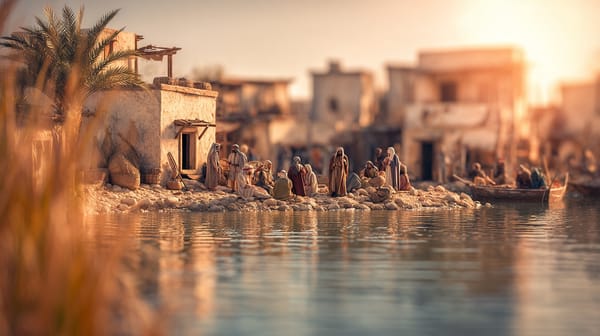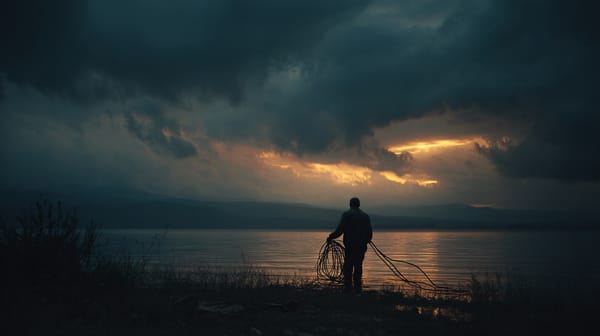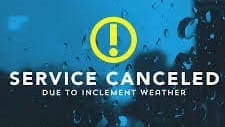Fairhaven Sermon 7-20-2025

Summary
In this week’s service, Rev. Dylan Parson challenged the congregation to move beyond a comfortable understanding of faith and confront the harsh realities of injustice. Drawing on the prophet Amos, Parson emphasized that God’s ruling attribute is love, but a love intertwined with a demand for righteousness and justice. He critiqued the tendency to seek comfort in church, contrasting it with Amos’s message of impending judgment for Israel's mistreatment of the poor and vulnerable, a warning applicable to contemporary society as well. Parson urged listeners to consider whether they desire to "flee from the wrath to come," a question posed by Amos and echoed in Wesley's early Methodist societies, rather than settling for a superficial faith.
Parson’s sermon highlighted the importance of aligning oneself with Jesus as a "plumb line," revealing areas where individuals and society fall short. He underscored the prophetic call to action, urging listeners to defy injustice and embrace a faith rooted in love and righteousness. Drawing on Colossians, he encouraged unwavering faith and action, reminding the congregation that true Christian living requires confronting difficult truths and actively working towards a more just world, rather than seeking solace in complacency.
Transcript
I've never really considered myself to be a fire and brimstone preacher. And my preference generally is to stick close to the theological understanding of John Wesley, no surprise there. And Wesley insisted that God's ruling attribute is love. That above all things, when it gets down to it, the one thing that will describe what God does, what God is, is love.
And that differs from other groups of Christians. It's not sovereignty or power, that's what Calvinists would usually say. It's not righteousness or justice like Lutherans might suggest. It's love.
Over all things, God is about love. However, I feel like I'm kind of cracking my evangelical knuckles here. I would suggest that preachers, myself included, can be a little bit too soft sometimes. We can be a little tepid in our focus on love, in confronting the powers and the principalities of a world that really is addicted to sin and to death, right? from our governing institutions all the way down to the way that we conduct our lives as individuals.
And I recognize that we all come to church for different reasons, and those reasons vary even from week to week. But one of those key drivers is often comfort. We want to hear a word that will soothe our weary souls. We want to sing some songs that will take us back to simpler times.
That's why I'm wedging this in with a hymn singe. We want to have some coffee and donuts. And then we want to go home and relax. Church is this hour where you don't have to think about the news.
You don't have to think about trouble with your parents or your kids or grandkids. You don't have to think about the stack of bills on the kitchen counter. And that's totally valid from time to time. Your church, your faith, your preacher are doing you a terrible disservice if your overwhelmingly However.
.. predominant experience of the Christian faith is one of comfort. The Southern Gothic writer Flannery O'Connor said that people think that faith is this warm electric blanket, but in reality it is the cross.
And I really have to remind myself of this sometimes, and Amos really is dragging us into it today. Right? The same John Wesley who staked his entire ministry on God being love above all other things, and he was correct about that, also had one single piercing question for anyone that sought to join one of his class meetings or societies that comprised the early Methodist movement. And that question was simply..
. Anybody? Okay, what? No. That's what he asked at the meetings. But before you're even allowed in, do you desire to flee from the wrath to come? A little harsher than we usually imagine, Wesley.
A little bit sharper than your average Methodist sermon these days. But it's a crucial question because the Lord our God is making all things new. The old is passing away. The new has come.
And we say this together almost every Sunday. Jesus Christ shall come again to judge the quick and the dead, the living and the dead. So our goal should never be to just, you know, slip into heaven under the wire. That's not what this is for.
Our goal is total righteousness, freedom, reconciliation in Christ. It's to be made perfect through God working in us. We can be sure that one day, maybe in this life, maybe in the ages to come, the wicked and the righteous will both receive from God what is rightly theirs. And there are some who will indeed receive the wrath of God, and I would like to be as far away from that as possible.
I'd like us all instead to be on the ark that is Jesus when the storms roll in. And so we turn to the prophet Amos today, who is not at all shy in talking about God's wrath, God's justice. Now, we get a little bit of this information in the passage itself, but here's some background as we jump in. Because we're jumping into Amos 7 here.
Amos is basically a farmer. He's not a priest or a prophet by trade. He's a shepherd, to be specific. He's a grower of sycamore trees, of sycamore figs.
And he comes from the village of Tekoa in Judah. And Judah is the southern portion of what was formerly, under David and his descendants, one big united kingdom of Israel. They split up. But the Lord has given Amos a vision, and he has sent him out as a prophet, not to his own country, but to the northern kingdom, which is still called Israel at this time.
He's from Judah, but he's preaching in Israel. And the time period here, by the way, just to give you a sense, is a couple decades. It's right around the same time as Isaiah, but a couple decades beforehand. And Amos' focus is very similar to Isaiah's.
He's warning the people of Israel that because of their injustice, because of their turning away from God, and particularly the way they treat the poor and the vulnerable, Okay? They're going to be conquered. They're going to be scattered by Assyria, this rising superpower to their northeast. The Assyrian threat is building, they don't see it. Amos is warning them that they're going to be taken by the sword because of the way they're behaving.
And basically what Amos is warning Israel about is a precursor, this kind of preview of what's going to happen to Judah a few decades later when they're conquered by Babylon. And then we see the Babylonian captivity, the exile, all that stuff as Israel is basically destroyed. Amos is promising in his prophecies nothing less than the final end of Israel as an independent monarchy. And that was it.
This was it. It never happened again. This is apocalyptic. And he's trying to get them to understand that there is a real reckoning coming.
So what we hear from Amos is a lot that should grab our attention. But there's one thing in particular that strikes me as eternally true. And that is this. When someone speaking on behalf of the Lord asks the people if they desire to flee from the wrath to come, and when he even offers them a chance to do so, an off-ramp, Bye.
their response is not, great, let's go, or, oh no, that's terrible. It's, shut up and go away. And that really is the crux of this story's exchange between Amos and Amaziah, who's the high priest of Bethel. God has given Amos this really stark vision of a plumb line.
You all know what a plumb line is. If you've never used one, it's literally just a weight on a string. And it's a tool that's used to measure the straightness, the uprightness of a wall. You hold it against the wall and see if it's square.
And God says that one of those has been placed in the midst of Israel as if to measure their uprightness. And the implication is they're not straight. They're not standing upright. They're not the way they're supposed to be.
They have been found wanting. And now God tells Amos he will never again forgive and restore Israel. Judgment will come in the form of the Assyrian sword. So Amos has been going around preaching this in Bethel.
That's the religious capital of the northern kingdom. It's like their Jerusalem. And Amaziah reports this to King Jeroboam. He's like, something is going on here.
And he reports that Amos is engaging in this sedition, undermining the king, this treason, speaking against the kingdom of Israel like this in public. He's getting people really upset. And they're trying to put a lid on this because presumably it's riling people up a bit. And Amaziah goes and confronts Amos and says, you who see things, what a way to talk about a prophet, right? You who see things, go.
Run away to the land of Judah, eat your bread there and prophesy there, but never again prophesy at Bethel. For this is the king's holy place and his royal house. That is, shut up and go away. Amen.
You're really ruining the vibes here, Amos. And he really is. Because the thing is, King Jeroboam II, who is the king at this time, is presiding over the absolute peak of Israelite power and prosperity. This is a golden age.
Israel is doing extremely well, as good as it will ever, ever, ever do. Even today, archaeologists looking back at this time period, confirm that during Jeroboam's reign, Israel is the most densely populated country in the region. It's extremely wealthy. It's become wealthy by trading luxury goods like wine, olive oil, fine horses, and ironically mostly with the Assyrian Empire that's soon going to wipe them out.
But things are really, really good when Amos is prophesying. So there's a little bit of a dissonance here. You can understand where Amaziah is coming from. What are you talking about? We're doing fine, actually.
The stock market is in excellent shape. The unemployment rate is very, very low. The military is strong as it's ever been. Leave us alone.
And I suspect there's another layer under this too, an implication that he's making. Leave us alone. If things are booming the way that they are, God must be blessing us. God is giving this to us and you are wrong.
So see, there's often this contradiction present whenever we're in good times. Prosperity and power are accompanied by fear, not too far below the surface, that all of this could come crashing down. Who knows how much damage the shepherd could do if he just keeps talking in Bethel. It isn't all that hard to drum up a rebellion, a market crash.
They were having assassination attempts right and left on Israelite kings at this time. It's not that hard to make that happen. So Amaziah's confrontation of Amos has what I read as a very noticeable tinge of frantic desperation in it. I hear some desperation.
Desperation. But in his conversation with King Jeroboam, the priest Amaziah expresses this fear of Amos' words in a different way. And he says it like this. The land isn't able to cope with everything that he is saying.
Isn't that such an interesting way to put it? He doesn't say that Amos is lying, you'll notice. What he is saying instead is that this very land, the people, the place, the fabric of the kingdom of Israel cannot handle what Amos is saying. It doesn't matter whether it's true or not, and so it has to be shut down. It doesn't matter if he's right.
It doesn't matter if he's wrong. We can't handle hearing it. It's not worth dealing with. It's too much trouble.
I'm reminded of a satirical movie that came out about five years ago, Leonardo DiCaprio. Don't Look Up on Netflix. Anybody seen it? But the president's, in that movie, there's a world-ending comet that looms ever closer in the sky. You know, people can see it moving towards Earth, this big rock hanging over them in the sky.
And everybody can see it. And the president's response to the people who are worried about it is, don't look up. That is their advertising campaign. Don't worry about it.
Don't look up. Keep on running over the cliff's edge, hanging in the air like Wile E. Coyote, praying that gravity never kicks in. Don't look at it.
And that's a deeply sad place for a priest to be. He ought to know better. Amaziah is desperately trying to preserve the status quo. He is completely cynical.
He represents a religion that has become so flimsy that he can't imagine that anyone genuinely speaks the word of God. And further, he refers to Bethel, a word that literally means house of God in Hebrew, Bethel, house of God. He refers to Bethel as the king's holy place and royal house, not God's, the king's house. The temple in Amaziah's eyes is not primarily God's, but exists in the service of the king.
It's a really blasphemous thing to say. It's offensive to God for any ruler to think they have a say over what comes out of the pulpit, so to speak. Because this is God's temple. It's not the king's.
It's not the emperor. It's not the president's temple. And so when Amos defends himself against Amaziah's allegations by saying he's not a prophet or a prophet's son, he's talking about what had become a lucrative career at the time. There were people who were vocational prophets.
They were court prophets. They were hired by the king to offer messages from God to tell them what to do. And Amos isn't a pro here. He's not a professional prophet who does this for the money or the recognition.
This isn't his job. It's his calling. He didn't want to go from Judah to Israel to prophesy. He was a shepherd.
He has this fig orchard. That's a way easier way to make money than going to a foreign land and shouting down its king. Calling an entire people to repentance, to change, to flee from the wrath to come. He would not be doing this if he had a choice.
And so Amaziah and King Jeroboam find out that they can't shut Amaziah up. They can't stop him from raining on their parade, from poking holes in this golden age. Because this word that comes from God can't be stopped. Prophets of God can be slandered, they can be criticized, they can be shouted at, but they cannot shut him up.
Pretty much the entire issue that Amos is speaking about is that Israel is mistreating the poor and the vulnerable. That's the whole issue here. The people whom they are commanded to care for countless times in the law of Moses, the widow, the orphan, the poor, the alien, or the immigrant, they're throwing them under the bus in the name of prosperity and power. And indeed, they actually resent that God expects them to behave with justice, with honor.
Wow. They complain in the next chapter. When will the new moon be over? So that we may sell grain. And the Sabbath, so that we may offer wheat for sale.
Make the ephah, a measure of grain, smaller. Enlarge the shekel. and deceive with false balances in order to buy the needy for silver, to buy the helpless for sandals, and sell garbage as grain. They hate that God wants to put the brakes on what they want to do.
And that includes committing fraud by lying about the weight of grain and the value of money. They want to milk a little bit more money out of the poor who are trying to buy food. They want to adulterate the grain. They want to add stuff to the grain so that it'll weigh more and they can make more money off it.
They want to force people into debt slavery. They want to cause the poor to be so vulnerable that they can be bought for a pair of sandals. And any attempt to shut Amos up is not going to change the reality that God will ensure that justice is done. In fact, God is offering them grace here.
God is doing them a service by offering them a prophet, by calling their attention back to the covenant that God has made with them, offering them again this off-ramp grace. to change their ways, to avoid destruction. That's what prophets are for, to give people a chance. But regardless of how they respond, as Amos says in chapter 5, this is what's going to happen.
Justice is going to roll down like rivers. Righteousness like an ever-flowing stream. And that's not supposed to be this image of natural beauty or whatever. This is supposed to be the unstoppable power of a flood, of holy justice, of righteousness, Righteousness.
washing away wickedness and sin like Pharaoh's soldiers as the Red Sea closes on them. That's what this role of justice looks like. And so Amos' warning here is meant for this particular people in this particular place, but it's also timeless because I think we're a country that thinks we're doing pretty well, after all. Yet our cities are dotted with tents and overdoses.
Credit card interest rates are so high that they'd have been viewed as obviously criminal 100 years ago, and we don't even think about that stuff as immoral anymore. An uncontrolled new epidemic is emerging as gambling addiction, which is accompanied by domestic violence with suicide, is through the roof. It's entirely illegal to lose everything you have to a slot machine on your phone. That would have been viewed as immoral by the church in the past.
Support for the poor and vulnerable is being rolled back. Foreigners in our land are being mistreated worse than they've been in generations. And so I ask, do we desire to flee from the wrath to come or not? We can tell ourselves like Jeroboam and Amaziah that God's not really concerned with any of our stuff. Just with our souls.
As long as we keep on praying in his name, singing his praises, putting crosses in our houses, going about our rituals. But that's not how it works. Because God's ruling attribute is love. Which means that God burns with anger at the mistreatment of his people and of creation.
And judgment will come. The Lord stands in our midst as a plumb line, showing right where we're crooked if we're willing to see it. And that plumb line, by the way, is Jesus himself. We put ourselves up to the example of Jesus and we see where we're right and where we're wrong.
Paul talks about this in his letter to the Colossians about how we can move forward in the midst of this destruction. He says, Once you were alienated from God, you were enemies with him in your minds, which was shown by your evil actions. But now he has reconciled you by his physical body through death to present you before God as a people who are holy, faultless, and without blame. But you need to remain well-established, rooted in faith, and not shift away from the hope that was given in the good news that you heard.
live in the grace, the power, the reckless love of Jesus. Hold on to him and his example. Defy a world of violence and injustice. That's what the church is for.
That's what our faith in Christ is for. Flee from the wrath to come. Lift high the cross and pull the world along with you. In the name of the Father and the Son and the Holy Spirit.
Amen.



